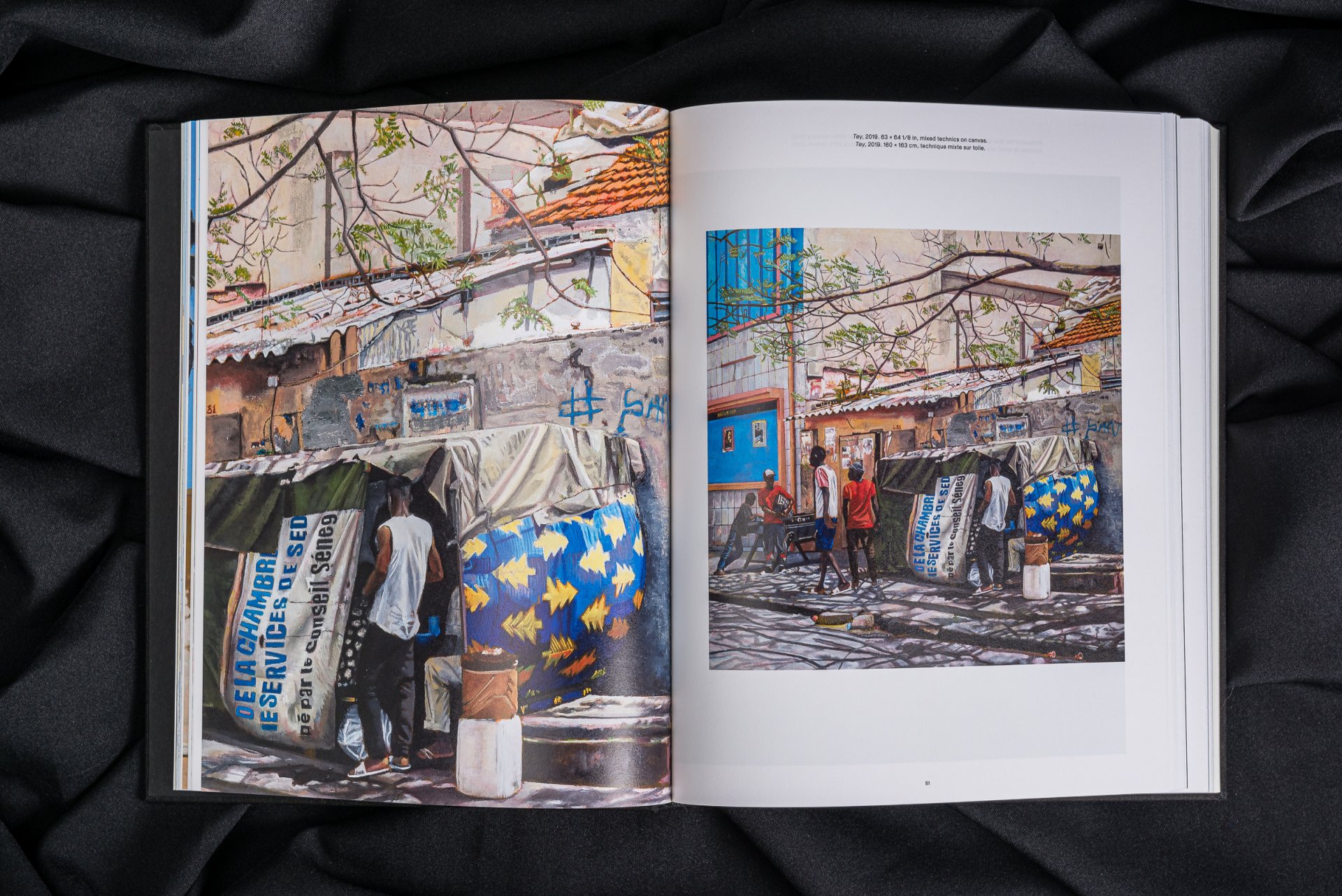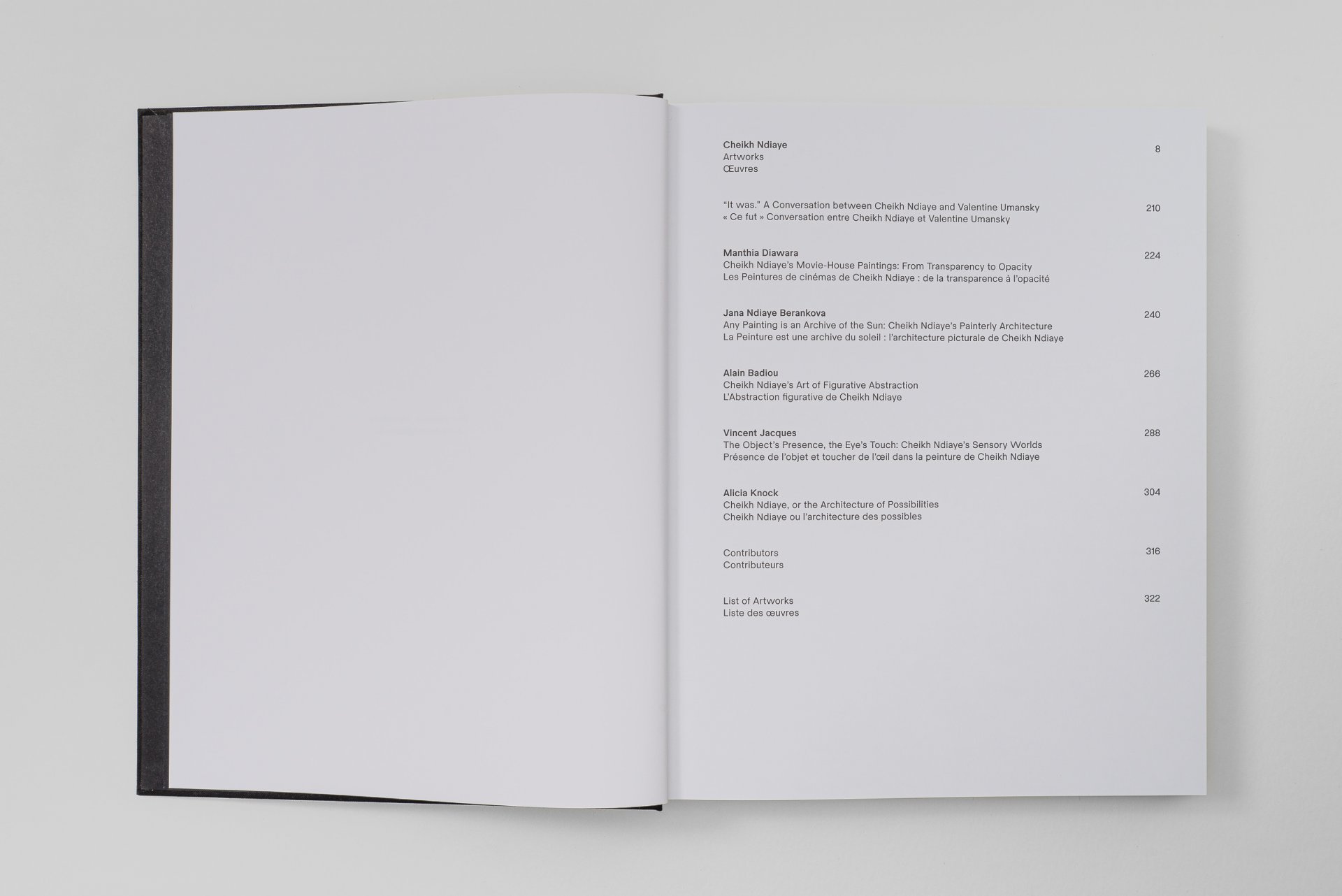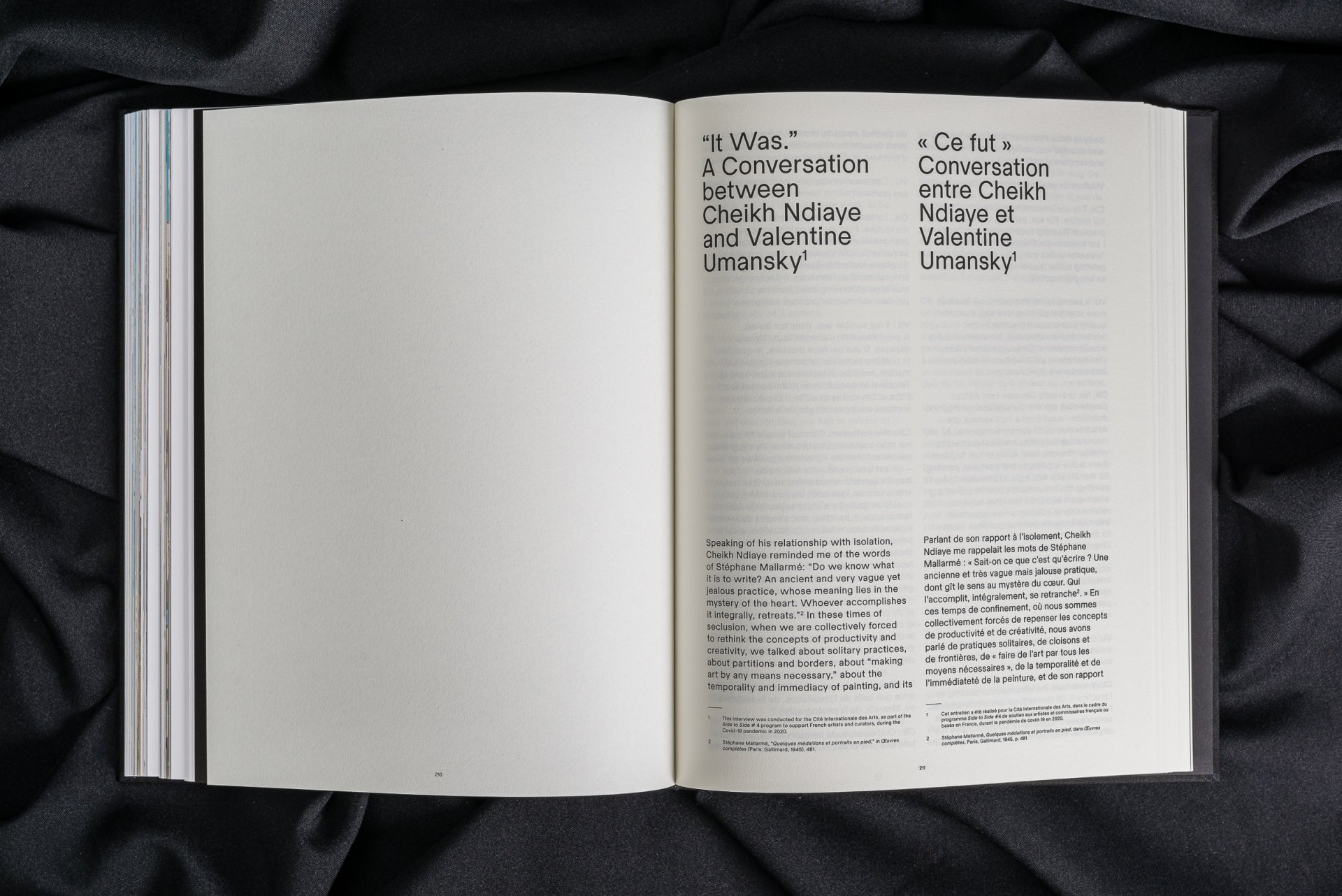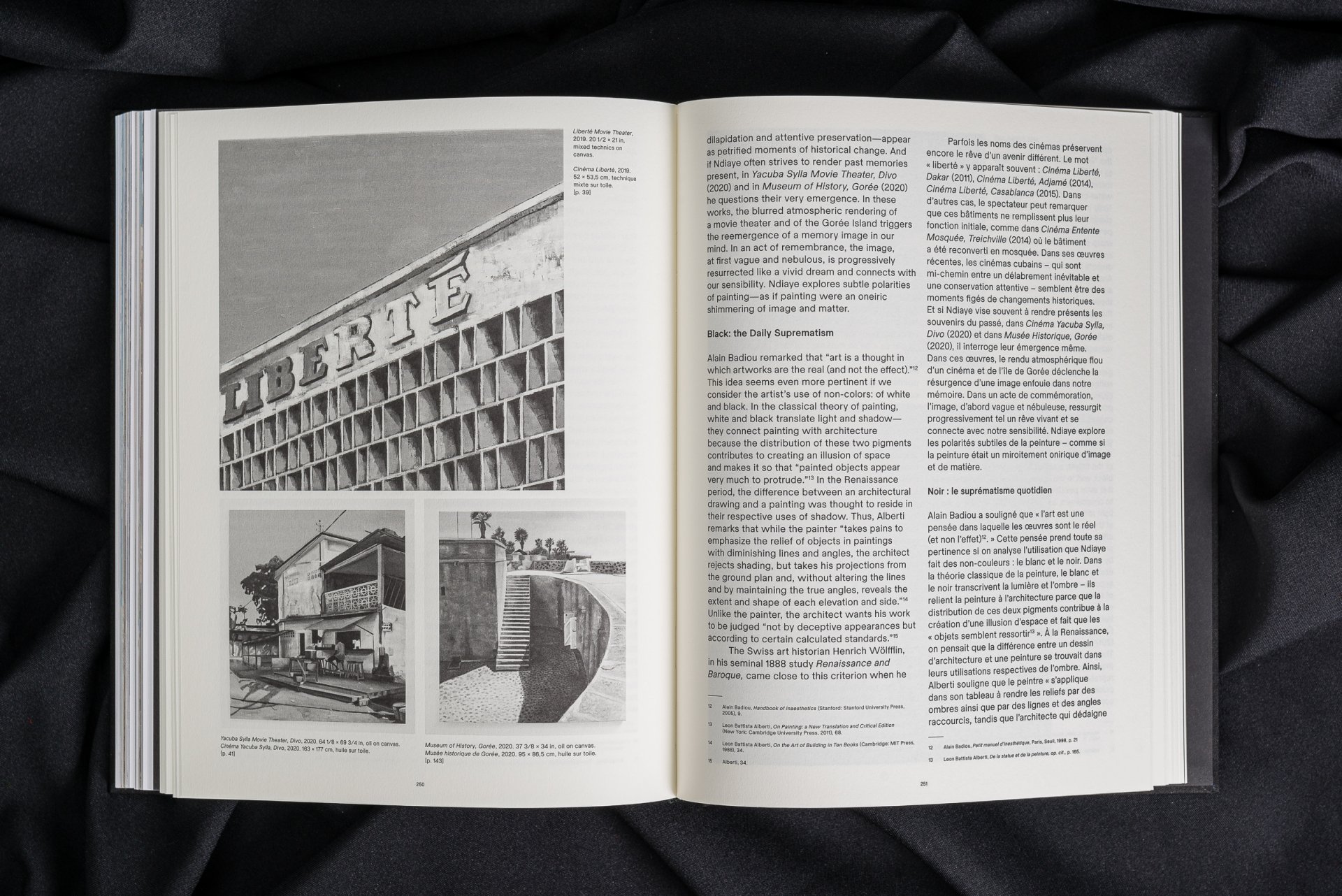Cheikh Ndiaye: Archives of the Sun
Cheikh Ndiaye
Archives du Soleil / Archives of the Sun
first monograph of the artist
332p.
23 x 29 cm
hardcover with cloth binding and foil stamp print
in French and in English (bi-lingual edition)
ISBN: 978-2-9569056-2-2
Contributors: Manthia Diawara, Alain Badiou, Alicia Knock, Jana Ndiaye Berankova, Vincent Jacques, Valentine Umansky
The book includes the transcript of the discussion between Mamadou Diouf, Étienne Balibar and Alain Badiou.
Suture Press is pleased to present Archives of the Sun/Archives du soleil, the first comprehensive monograph on the contemporary artist Cheikh Ndiaye, which includes reproductions of all of his paintings and installations. Ndiaye portrays urban environments in Africa and regions marked by the presence of the African diaspora. In his paintings, he often depicts former movie theaters and informal vendors’ kiosks in Africa as well as cinematographic and archival images which point to the pictorial beauty of the African continent. Ndiaye’s work subtly interrogates the current state of the dream of Independence, the role of the archives, and our ability to recollect memory images.
In addition to more than 200 pages of color illustrations, the book includes contributions by scholars, filmmakers, curators, and philosophers. It proposes a multiplicity of possible interpretative approaches towards Ndiaye’s work, thus emphasizing the inherent ambiguity of any great art. The filmmaker and historian of African cinema, Manthia Diawara, gives a personal and poetic testimony on the artist’s work while reading it through the lens of Édouard Glissant’s writings. The philosopher Alain Badiou interprets Ndiaye’s work as an example of “figurative abstraction” while this notion is questioned by philosopher Étienne Balibar and historian Mamadou Diouf in a discussion about Badiou’s text. In the interview with Valentine Umansky, curator of international art at Tate Modern, Ndiaye speaks of the role of archives and museums in Africa while describing painting as a practice of retreat. Alicia Knock, curator at Centre Pompidou, emphasizes the African context of the artist’s work while also reminding us of the latter’s passion for the poetry of Stéphane Mallarmé. The philosopher Vincent Jacques speaks of the connection between the haptic and optic qualities in Ndiaye’s work, while the essay by Jana Ndiaye Berankova, philosopher and architecture historian, questions the links between painting and architecture.
The book is published as a bi-lingual (French and English) hardcover edition including two different kinds of graphic paper. Its black matt cloth binding contrasts with the shiny foil-stamp print on the cover and spine of the book. The cover includes an integrated reproduction of one of the artist’s paintings.
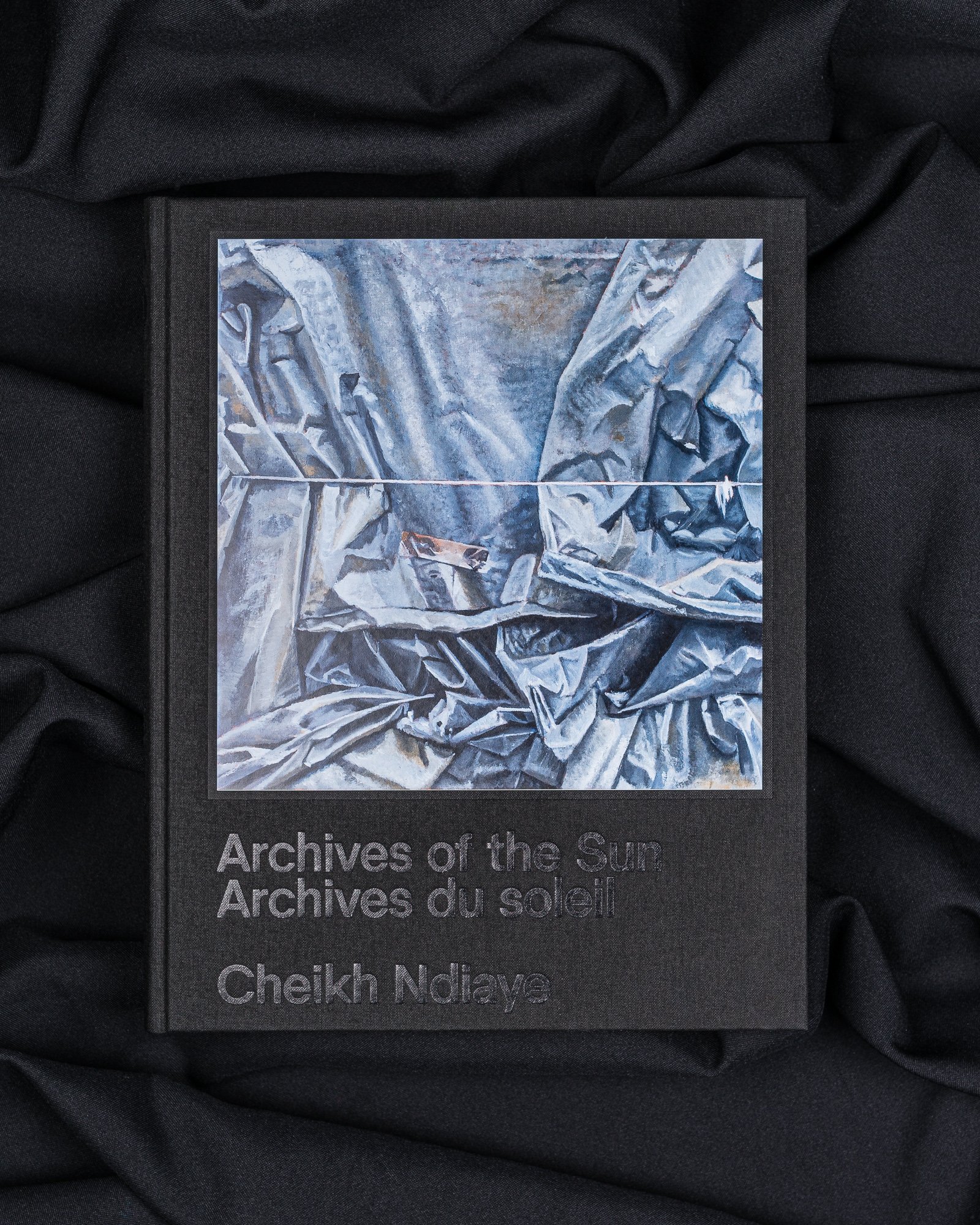
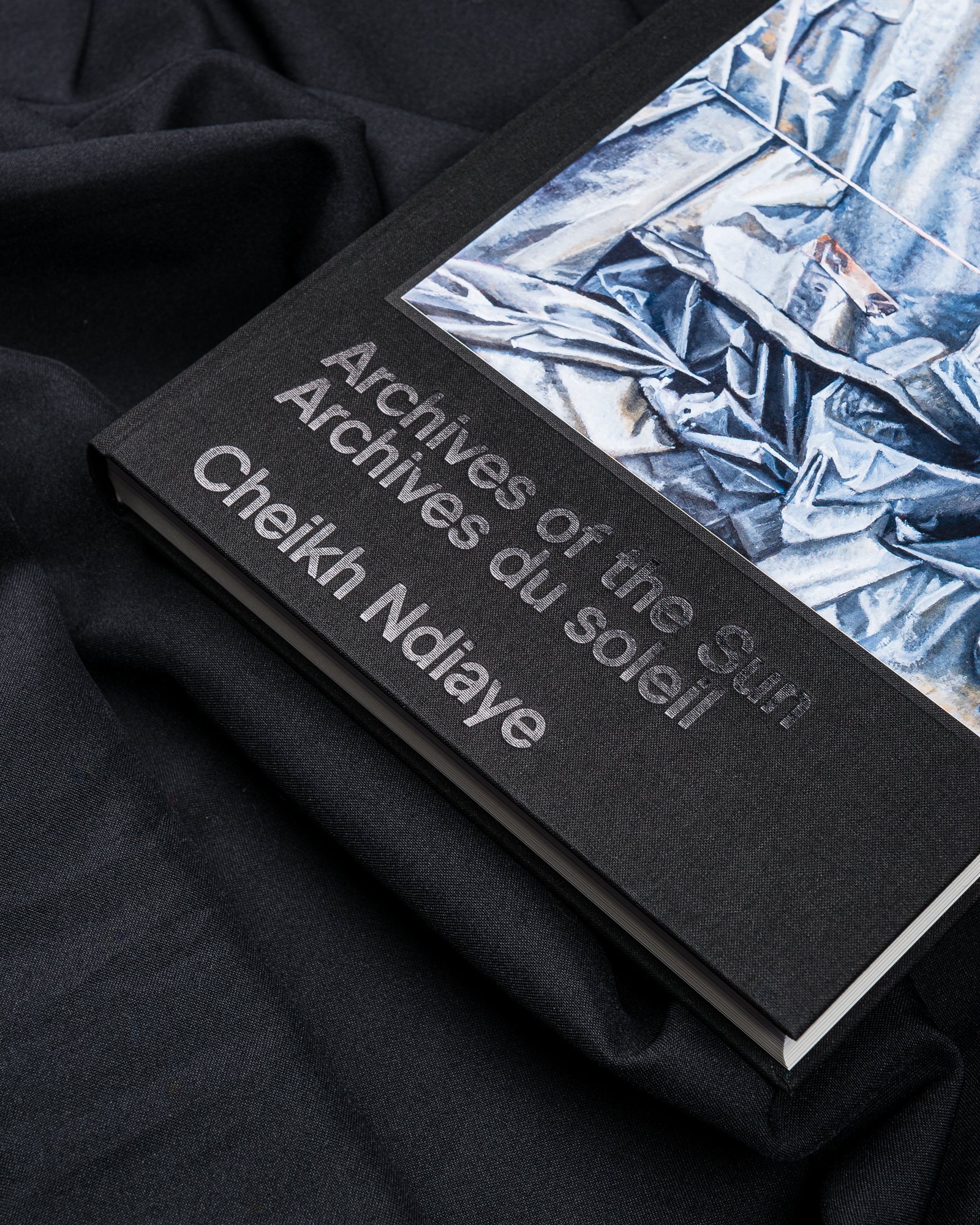
Contributors:
Cheikh Ndiaye lives and works in New York and Dakar. He graduated from the National School of fine Arts in Dakar and the School of Fine Arts in Lyon, France. He has participated in numerous exhibitions across Africa and Europe namely Hippocampus at La Maréchalerie in Versailles in 2017 and in his solo exhibitions at the Galerie Cécile Fakhoury. His work is a part of the permanent collections of the Centre Pompidou, Paris, FRAC, Grand-Large-Hauts-de-France, CNAP and Kadist Art Foundation. His work was exhibited at the 56th Venice Biennale All the World’s Futures, curated by Okwui Enwezor, Dak’Art Biennale (2012, 2016, and 2018) and Havana Biennale (2019). Most recently, Ndiaye's work was included in Sanguine. Luc Tuymans on Baroque at Fondazione Prada in Milan, Italy.
See:
Cécile Fakhoury Gallery
Jason Haam Gallery
Manthia Diawara is a professor in the Department of Cinema Studies at New York University's Tisch School of the Arts. He has taught at the University of California at Santa Barbara and the University of Pennsylvania. He is the author of We Won't Budge: An African Exile in the World (2003), Black-American Cinema: Aesthetics and Spectatorship (1993), African Cinema: Politics and Culture (1992), and In Search of Africa (1998). He has published widely on the topic of film and literature of the Black Diaspora. Professor Diawara also collaborated with Ngûgî wa Thiong’o on the documentary Sembène: The Making of the African Cinema, and directed the German-produced documentary Rouch in Reverse.
Alain Badiou is a French philosopher and playwright. He is a professor emeritus and former chair of the Department of Philosophy of the École Normale Supérieure in Paris and one of the founding members of the Faculty of philosophy of the Université Paris VIII. His major works include Being and Event, Logics of Worlds, and The Immanence of Truths. His philosophical oeuvre connects continental and analytical philosophical traditions along with his reflections on set theory and contemporary mathematics.
Alicia Knock is a curator at Centre Pompidou, the National Museum of Modern Art. She seeks to develop specific geographical scenes (Africa, Central Europe) at the Centre Pompidou, both in terms of acquisitions and exhibitions (Ernest Mancoba, 2019; China Africa, Crossing the World Color Line, 2020; Global-e Resistance, 2020). She seeks to explore new exhibition formats through prospective projects questioning the museum of tomorrow (Museum On/Off, 2016; Harmony Korine, 2018) and is particularly interested in the visibility of woman artists (La terre la plus contraire, 2017; Soudain mon ombre s'est allongée…, 2018) She was also curator of the Albanian Pavilion at the 58th Venice Biennale and co-curator of an exhibition dedicated to Boris Mikhailov at the Pinchuk Art Centre in Kiev (2019).
Valentine Umansky is currently acting as Curator of International Art at Tate Modern. She has previously held positions at the International Center of Photography, The Museum of Modern Art, the Contemporary Arts Center in Cincinnati, and the festival Rencontres d’Arles. In 2018, she co-curated the LagosPhoto festival and with Iheanyi Onwuegbucha, she co-organized the exhibition Layers (2019-2020). She is the author of Duane Michals, Storyteller: petite histoire du rapport fluctuant entre texte et image (2015) and has published in magazines such as Aperture and FOAM. In 2020, she organized two solo exhibitions of Pamela Phatsimo Sunstrum and Saya Woolfalk, and Confinement. Politics of Space and Bodies.
Jana Ndiaye Berankova is a philosopher, writer, publisher and architecture critic. She is a PhD candidate at Columbia University's Graduate School of Architecture, Planning and Preservation (GSAPP) and a former student of École Normale Supérieure in Paris and École des Hautes Études en Sciences Sociales. Her research interests include the links between continental philosophy and architectural theory, social movements of 1968, and Central European architecture. She co-edited Alain Badiou: Sometimes, We Are Eternal (2019), Revolutions for the Future: May ’68 and the Prague Spring (2020) and the issue of Filozofski Vestnik “Thinking the Infinite” (2020). She is the founder of the publishing house Suture Press, and a member of the Prague Axiomatic Circle.
Vincent Jacques is an associate professor of philosophy at École Nationale Supérieure d’Architecture de Versailles, program director at Collège International de Philosophie, and researcher at the HAR EA 4414 laboratory, Université de Paris X – Nanterre. He is the author of Deleuze (2014) and Chris Marker, les médias et le XXe siècle. Le revers de l’histoire contemporaine (2018). He is currently conducting a research program on Harun Farocki and his relationship to history and technology, at the MSH Paris Nord.
Discussion participants:
Mamadou Diouf
Étienne Balibar
Alain Badiou
Reza Naderi
Norman Madarasz
